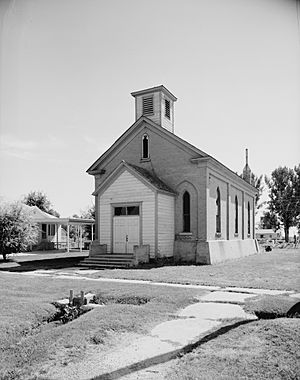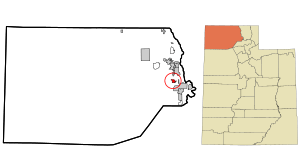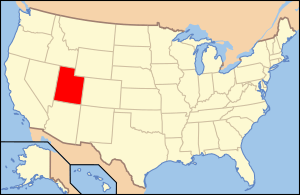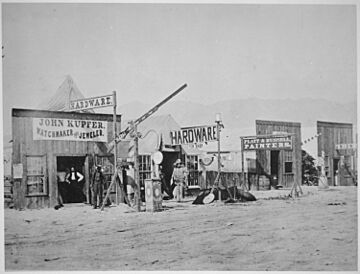Corinne, Utah facts for kids
Quick facts for kids
Corinne, Utah
|
|
|---|---|
|
City
|
|

Corinne Methodist Episcopal Church
|
|
| Nickname(s):
"Gateway to the Golden Spike"
|
|

Location in Box Elder County and the state of Utah
|
|

Location of Utah in the United States
|
|
| Country | United States |
| State | Utah |
| County | Box Elder |
| Founded | 1869 |
| Incorporated | February 18, 1870 |
| Founded by | Mark A. Gilmore |
| Named for | Corinne Williamson |
| Area | |
| • Total | 3.84 sq mi (9.95 km2) |
| • Land | 3.78 sq mi (9.79 km2) |
| • Water | 0.06 sq mi (0.16 km2) |
| Elevation | 4,236 ft (1,291 m) |
| Population
(2020)
|
|
| • Total | 809 |
| • Density | 210.7/sq mi (81.31/km2) |
| Time zone | UTC-7 (MST) |
| • Summer (DST) | UTC-6 (MDT) |
| ZIP code |
84307
|
| Area code | 435 |
| FIPS code | 49-15830 |
| GNIS feature ID | 2410228 |
Corinne is a city in Box Elder County, Utah, United States. It is sometimes called the "Gateway to the Golden Spike." In 2020, 809 people lived there. This was more than the 685 people counted in 2010.
Contents
History of Corinne
Corinne was founded on March 25, 1869. For nearly ten years, it was known as the "non-Mormon Capital of Utah." This means it was a place where people who were not members of the Church of Jesus Christ of Latter-day Saints (LDS Church) lived and worked.
Railroad Town Beginnings
In 1869, two big railroads, the Union Pacific Railroad and the Central Pacific Railroad, were about to meet. This meeting would complete the Transcontinental Railroad, which connected the East and West coasts of the U.S. A group of former soldiers and business people from Salt Lake City decided to create a town for non-Mormons. They hoped this town could compete with the Mormon settlements in Utah.
They chose a spot near Brigham City on the Bear River. This was where the railroad crossed the river. One of the founders, General J. A. Williamson, named the town after his 14-year-old daughter, Corinne. The town was meant to be a key spot for shipping goods to mining towns in Montana along the Montana Trail.
Life in Early Corinne
At its busiest, Corinne had about 1,000 people living there. The local newspaper proudly said that none of them were Mormon. Corinne was a lively "end-of-the-trail" town. It felt very different from the quieter Mormon towns in Utah.
It had many businesses, but also lots of places to buy drinks. An elected town marshal worked to keep order. People living in Corinne tried to make it a proud and peaceful community. But they also had to deal with many tough freighters and stagecoach drivers.
Political Efforts and Decline
The leaders of Corinne tried to use their position as a non-Mormon city. They wanted to break the strong political and economic power held by the Mormons in Utah Territory. They tried to get their leader, J. A. Williamson, named as the governor of the territory. They also tried to make Corinne the capital of Utah. However, they did not succeed in any of these efforts.
The town of Corinne started to decline when Brigham Young and the Mormon people built a new railroad. This was the Utah and Northern Railway, which went from Ogden to Franklin, Idaho. In 1877, the Union Pacific bought this new line. They extended it north through Idaho.
This new railroad line took over the job of carrying goods. Wagons from Corinne were no longer needed. The non-Mormon business owners soon left Corinne. They moved to Ogden or other railroad towns. Mormon farmers then bought the land around Corinne. This turned Corinne into another Mormon settlement.
In 1877, a local LDS Church group was formed in Corinne. But it closed when many people moved away. Later, as more farmers settled in the area, the group was started again. A meetinghouse was built in 1914.
Geography of Corinne
Corinne is located in the southeastern part of Box Elder County. It sits on the west side of the Bear River. It is the last town on the river before it flows into the marsh areas that lead to the Great Salt Lake.
Brigham City is about 6 miles (9.7 km) to the southeast. Bear River City is about 5 miles (8.0 km) to the north. The city covers a total area of about 3.9 square miles (10.1 sq km). Most of this area is land, with a small part being water.
Population and People
Corinne has seen its population change over the years. Here's how many people have lived there:
| Historical population | |||
|---|---|---|---|
| Census | Pop. | %± | |
| 1900 | 323 | — | |
| 1910 | 231 | −28.5% | |
| 1920 | 394 | 70.6% | |
| 1930 | 352 | −10.7% | |
| 1940 | 411 | 16.8% | |
| 1950 | 427 | 3.9% | |
| 1960 | 510 | 19.4% | |
| 1970 | 471 | −7.6% | |
| 1980 | 512 | 8.7% | |
| 1990 | 639 | 24.8% | |
| 2000 | 621 | −2.8% | |
| 2010 | 685 | 10.3% | |
| 2020 | 809 | 18.1% | |
| U.S. Decennial Census | |||
In 2000, there were 621 people living in Corinne. There were 190 households, and 159 families. The average household had about 3.27 people. The average family had about 3.64 people.
About 34.3% of the people were under 18 years old. About 9.3% were 65 years or older. The average age was 31 years old.
Schools in Corinne
For some years, Corinne had its own elementary school. However, it was later closed. Students from Corinne now attend Century Elementary School in Bear River City.
See also
 In Spanish: Corinne (Utah) para niños
In Spanish: Corinne (Utah) para niños
 | DeHart Hubbard |
 | Wilma Rudolph |
 | Jesse Owens |
 | Jackie Joyner-Kersee |
 | Major Taylor |


